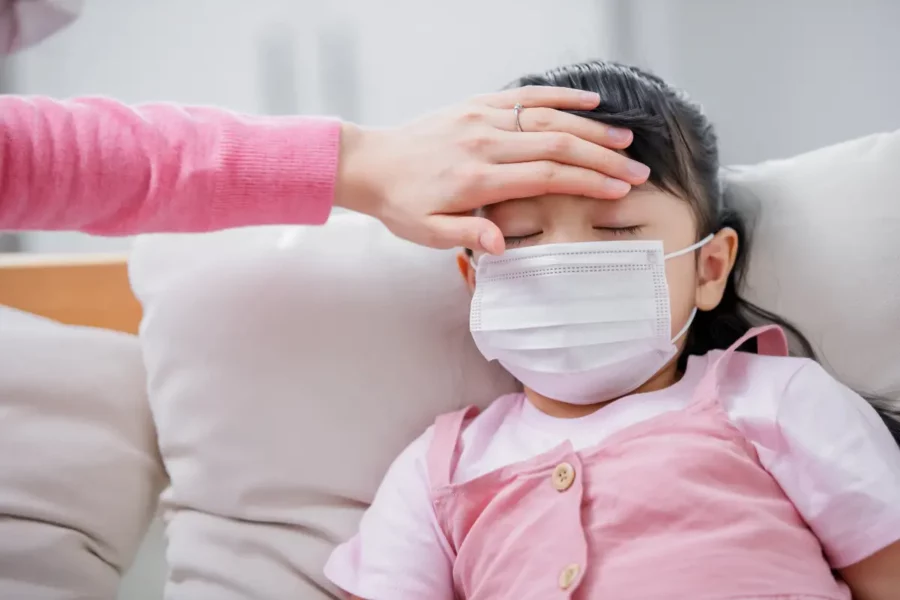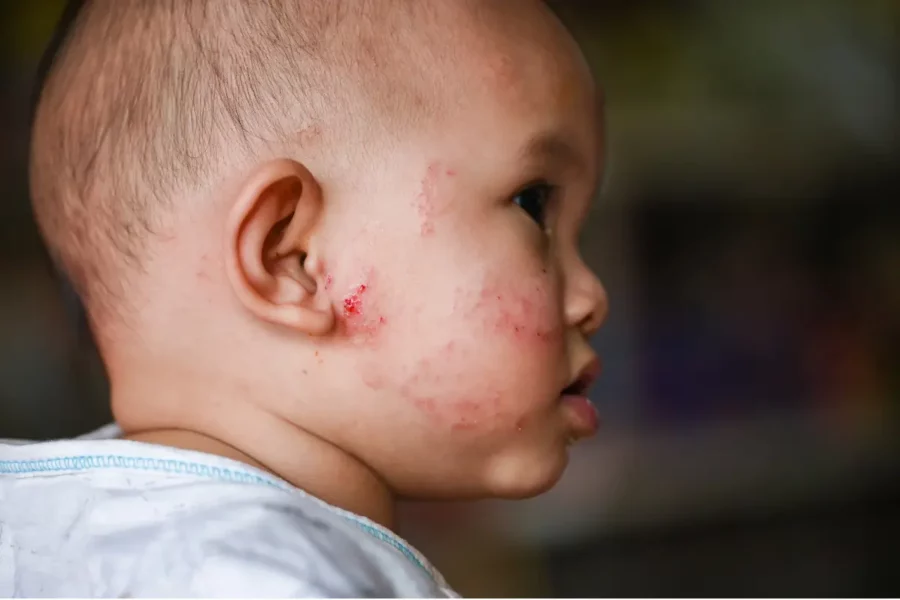It’s really important for parents to know about common illnesses in kids under 3. In Singapore, these illnesses can really affect a toddler’s health. Being aware and ready to act is key. We’re talking about things like fever, which means a temperature above 38°C, chickenpox, and stomach bugs. Knowing about these issues helps parents watch out for symptoms. They should be ready to get help if needed, as kids’ bodies are still building up their defenses.
Learning about common sicknesses is more than just being prepared. It helps parents decide what’s best for their child’s health. Looking at these ten main conditions shows us how important it is to be watchful and respond correctly when our little ones are unwell.
Key Takeaways
- Fever in children is defined as a temperature over 38°C; prompt medical attention is crucial for young infants.
- Common illnesses such as chickenpox, colds, and ear infections are widespread among children under three.
- Other frequent conditions include hand, foot, and mouth disease (HFMD), croup, and bronchiolitis, which often affect kids below three.
- Signs of serious illness include persistent irritability and difficulty breathing, which require immediate medical care.
- Young children in childcare settings are more susceptible to infections, often experiencing 6 to 8 colds per year.
- Maintaining proper hygiene and nutrition can significantly strengthen infants’ and toddlers’ immunity.
Understanding Early Childhood Illnesses
Parents are key in monitoring toddler health through early childhood challenges. Knowing common signs and symptoms can greatly help young kids. This vigilance helps start the right care early for their wellbeing.
Importance of Monitoring Toddler Health
Watching a child’s behavior and health is crucial for spotting common childhood symptoms. Symptoms like constant coughing, fevers, and irritability need medical attention. About 20% of kids in Singapore have asthma, needing careful watch for breathing issues. Allergic rhinitis is also common and needs early care for better control.
Common Symptoms of Childhood Diseases
Knowing what signs to look for helps parents. Chickenpox spreads easily, showing as a rash and fever. Other usual problems are:
- Frequent colds: Kids may get up to 10 a year.
- Ear infections: More common in kids than adults.
- Constipation: Shown by a hard belly and fussiness.
- Skin issues like eczema: Often tied to family allergies.
Spotting these signs early is key to understanding a child’s health. For severe signs like sharp wheezing or ongoing vomiting, seeing a doctor right away is crucial.
Common Illnesses in Kids Below 3 Years Old
Kids under three years old face a higher risk of certain sicknesses. They are more likely to get fever, febrile seizures, chickenpox, and gastroenteritis. Knowing about these common illnesses, how to spot their signs, and what to do is very helpful for parents. This knowledge is vital in looking after their child’s health well.
1. Fever and Febrile Seizures

Fever can cause febrile seizures in young kids, usually between six months to six years old. About one-third may experience such seizures because of high fevers. This shows why keeping an eye on their temperature is key. Though febrile seizures are scary, they rarely lead to serious problems. However, if a child’s fever hits 41.0°C or 38.0°C for babies under three months, get medical help right away. When a seizure happens, make sure the child is safe and never put anything in their mouth.
2. Chickenpox

Chickenpox in toddlers shows up as fever and itchy red spots. These signs show up about two weeks after they catch it, spreading easily to others. To lower the risk, vaccination is suggested between 12 and 18 months. Good cleanliness habits can also help stop the spread, which is important in places like childcare centers.
3. Gastroenteritis
When a child gets gastroenteritis, watch for watery stools, vomiting, and a drop in energy. Staying hydrated is key because young children can quickly become dehydrated. If these symptoms don’t improve or get worse after a few days, see a doctor. Keeping them on a soft diet and ensuring they drink plenty of fluids will help them feel better.
4. Hand, Foot, and Mouth Disease (HFMD)
HFMD is a viral illness common in toddlers, causing blisters on hands, feet, and inside the mouth, along with fever. It spreads through close contact and contaminated surfaces. Good hygiene and limiting contact with infected individuals can reduce the spread.
5. Bronchiolitis
Caused by viruses like RSV, bronchiolitis inflames the small airways in the lungs. Symptoms include wheezing, coughing, and difficulty breathing. Ensuring adequate hydration and consulting a doctor if breathing worsens is essential.
6. Croup
Croup causes a distinctive barking cough and hoarseness, often accompanied by breathing difficulties. It typically arises from viral infections. Staying calm and using a cool-mist humidifier can help relieve symptoms. Severe cases require medical attention.
7. Ear Infections
Middle ear infections are common in young kids, leading to ear pain, fever, and irritability. They often occur after colds or respiratory infections. Prompt treatment can prevent complications.
8. Allergic Rhinitis
This condition triggers sneezing, nasal congestion, and itchy eyes, often due to allergens like dust or pollen. Early management, including antihistamines or allergen avoidance, can help.
9. Eczema

Eczema causes dry, itchy, and inflamed skin, often linked to family allergies. Keeping the skin moisturized and avoiding triggers like certain soaps can improve the condition.
10. Constipation
Constipation, marked by infrequent or hard bowel movements, is common in toddlers transitioning to solid foods. Providing fiber-rich foods and encouraging water intake can ease the problem.
Prevention and Care for Toddler Health
To keep toddlers healthy, we need to be active in our approach. This includes keeping them clean, feeding them right, and getting advice from doctors when needed. Though kids often get sick, especially where there are many children, we can lower these risks. Through certain practices and being aware, parents are key in stopping kids from getting sick.
Maintaining Hygiene to Prevent Illness
Good hygiene for toddlers is vital in fighting off common sicknesses. Washing hands often helps stop infections from spreading. It’s important to wash hands before eating, after going to the bathroom, and after playing. Here’s what you can do:
- Encourage regular handwashing using soap and water for at least 20 seconds.
- Use alcohol-based hand sanitiser when soap and water are unavailable.
- Clean toys and frequently touched surfaces regularly to eliminate germs.
- Avoid contact with sick individuals, especially in the presence of a newborn or premature baby.
Nutritional Tips to Strengthen Immunity
Nutrition is key to a toddler’s health. Feeding them well helps their immune system. Aim for a diet full of fruits, veggies, grains, and proteins. To boost your toddler’s nutrition:
- Incorporate a variety of colours in meals to ensure a wide range of nutrients.
- Prioritise breastfeeding for infants when possible, as it offers essential antibodies.
- Include foods high in vitamins C and D to bolster immunity.
- Establish regular meal and snack times to foster healthy eating habits.
When to Consult a Paediatrician
It’s important to know when to see a doctor for your child’s health. Seek help if your child has:
- Persistent irritability and poor feeding that lasts for an extended period.
- Unusual rashes or skin changes that do not improve.
- Signs of severe illness such as high fever or lethargy.
- Gastrointestinal issues like persistent vomiting or severe diarrhoea.
By following these steps, parents can shield their toddlers from many illnesses. Regular doctor’s visits let you bring up any worries. They also make sure your child is growing as they should.
Conclusion
Knowing about illnesses in kids under 3 is very important. It helps keep children healthy. Parents and caregivers should watch their kids’ health closely. Spotting problems early and treating them quickly makes a big difference.
In Singapore, keeping children healthy is everyone’s job. Parents and the public health system need to work together. Going to the doctor regularly helps catch and treat illnesses early. Knowing what symptoms to look for means parents can protect their kids’ health. This helps keep the whole community strong and healthy.




